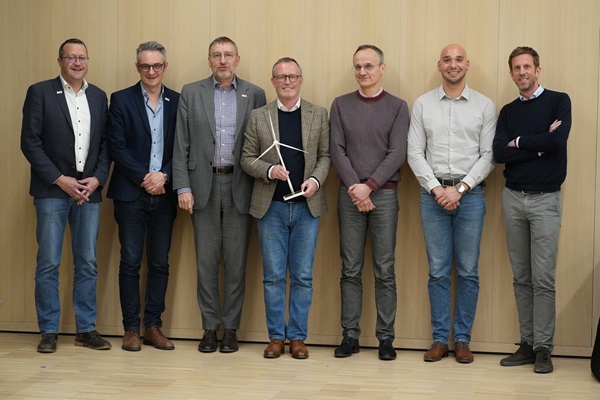 Credit: Soler & SEBES
Credit: Soler & SEBES
The Soler company and the dam water union of Esch-sur-Sûre (Syndicat des eaux du barrage d’Esch-sur-Sûre - SEBES) presented their joint project entitled “Wandpark Eschdorf” as part of an information meeting at the SEBES premises in Eschdorf.
The project is a wind turbine aiming to produce up to 23.5 GWh annually, thus saving around 15,275 tonnes of CO2 per year. This is equivalent to the electricity requirement for the production and distribution of drinking water for SEBES. “Wandpark Eschdorf” is expected to enter the permitting phase in the coming weeks, with its construction planned for the second quarter of 2025, the partners noted.
After carrying out feasibility studies, detailed analyses and selecting the site, Soler and SEBES were able to present the wind farm project "Wandpark Eschdorf" on Wednesday 24 April 2024. A new wind turbine is planned to the west of Eschdorf, which is a small town in the municipality of Esch-sur-Sûre, where a Soler wind turbine is already operating as part of the “Wandpark Esch-Sauer” as well as another, belonging to the “Wandpark Kehmen-Heischent”.
The information meeting allowed the various stakeholders in the project to discuss the progress of the implementation of the wind turbine, its planning phases and technical characteristics as well as the assessment of the impacts on residents and the environment (including a participatory and sustainable approach). According to Soler and SEBES, the authorisation procedures will begin in the coming weeks, and construction of the wind farm is planned for the second quarter of 2025.
If the beginnings of the “Wandpark Eschdorf” project go back a few years, its design in its current form has been in creation since 2021 and its singularity lies in two characteristics: the “joint venture” of Soler and SEBES as well as the new model of wind turbine selected.
According to the companies, the estimated production of this "joint venture" can cover the current electricity needs of SEBES and therefore ensure the treatment and distribution of drinking water, even in the purely hypothetical case where the country would be victim of a total power outage. The critical infrastructure of SEBES could therefore continue the production and distribution of drinking water.
The type of wind turbine recommended is the latest generation: the Enercon-E-175 model, whose installed power amounts to 6 MW, for an annual production estimated at 23.5 GWh, or more than six times the annual energy needs of households in the municipality of Esch-sur-Sûre, which underlines the regional scope of the project. Located nearly 1200 m from the first homes, the site blends into the environment, respecting nature and in harmony with the inhabitants.
Continuous technological development has made it possible to multiply by 40 the energy produced by a single wind turbine since the first models were installed in Luxembourg in the 1990s. The electricity produced by the “Wandpark Eschdorf” wind farm will thus save around 15,275 tonnes of CO2 per year, according to the standard calculation used to compare with the emissions of a gas turbine, Soler and SEBES emphasised.
In addition to the presentation of the Eschdorf wind farm, the information meeting on Wednesday evening addressed citizen participation in the context of the wind farm, including a wind turbine commissioned by Soler at the end of 2022. Through the participatory approach of Soler projects, citizens will have the opportunity to contribute in the capital of the companies of the various wind farms, after an entire year of operation during which Soler will have been able to ensure the productivity and profitability of the fleet. The same approach will be adopted by Soler and SEBES within the framework of the “Wandpark Eschdorf” wind farm.
“We welcome the good collaboration with SEBES and local politicians, as well as the public's receptiveness to the benefits offered by wind energy and its contribution to achieving environmental objectives,” said Paul Zeimet, General Director of Soler.
André Weidenhaupt, President of SEBES and Georges Kraus, Director of SEBES, underlined the importance of this winning duo embodied by SEBES and Soler: “This collaboration associates SEBES with the existing commitment in Luxembourg to be able to move forward in the field of sustainable energies. For SEBES, which has been based in the commune of Esch-sur-Sûre for almost 60 years, it is important to be able to also become a partner in the field for the production of drinking water from renewable energies, and thus demonstrate to what extent the north of the country offers varied possibilities, whether in the field of drinking water supply or the production capacity of renewable energies. "








